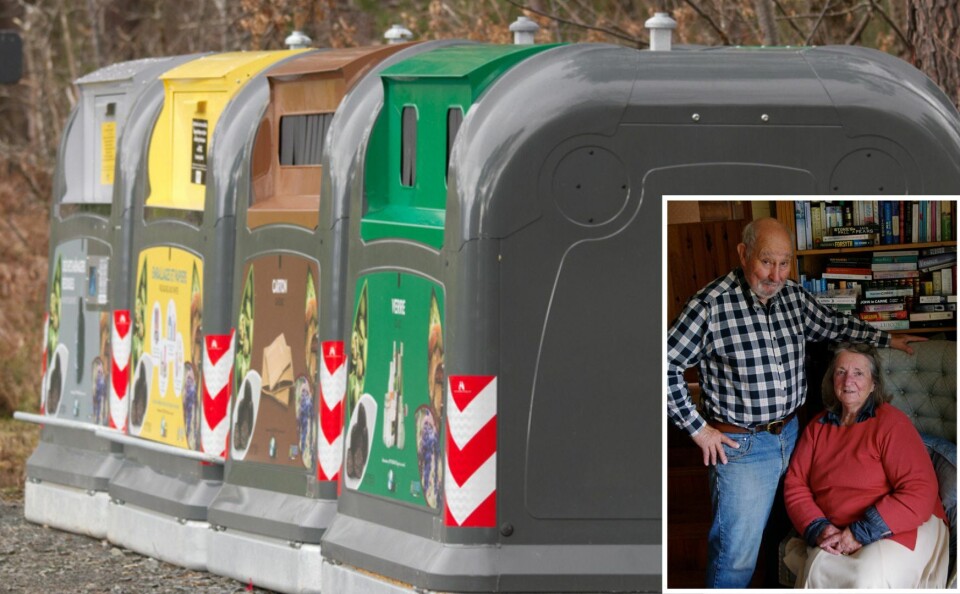-
How to dispose of bulky waste in France
Furniture, white goods…gas bottles? What counts as bulky waste and how to dispose of it
-
Local officials in south-west France search dumped bin bags to identify culprits
Around half of residents yet to collect access cards for new communal bins
-
French village latest to end door-to-door rubbish collection
The €1 million project is intended to ‘reduce anti-social waste behaviour’
Stroke victim in Dordogne faces €2,000 a year waste collection bill
Disposing of husband’s incontinence pads now involves driving to find card-operated collection bins and a large bill

A couple face a rubbish collection bill of up to €2,000 a year due to the disposal of incontinence pads after the husband suffered a stroke.
Their waste service bills them for extra rubbish after a set quota, with no allowance for disability.
Dordogne waste syndicate SMD3 introduced an electronic card system to access bins in January, leaving British residents Maureen Hemingway-McLeod, 77, and husband Martin, 80, with a problem.
‘The council cannot change a system which has been imposed on it’
“Before, we put the pads in blue bio-waste bags, and put them in the wheelie bin containers for black bags at the crossroads to our house.
“They were emptied by the rubbish collectors,” said Mrs Hemingway-McLeod.
“There are usually eight biohazard bags a week. Now we have to drive into Verteillac, (about 1km) or Saint-Martial-Viveyrol village (about 3kms) to find card-operated collection bins.
“We use the card each time we put a sack in, under a system where we pay a standard €252 for an expected single black bag a fortnight.
“Every time we swipe the card, the bill goes up. Our mayor has calculated the cost for the year will be at least €2,000, but there is nothing the municipal council can do about a system which has been imposed on it.”
Read more: French homeowners challenge ‘pay per bag’ waste charge
‘The bins are too high for me. I am only five feet tall’
Mr Hemingway-McLeod, a former planning director for the Eurotunnel construction project, has helpers come in to shower and dress him.
However, neither his helpers nor his doctor or pharmacy have been able to find a way for the couple to dispose of the bags without being hit by huge charges from SMD3.
As well as worrying about the bills, Mrs Hemingway-McLeod, a former health and safety consultant who is disabled due to back injuries, says using the card-operated bins is difficult.
“The bins in Verteillac are too high for me. I am only five feet tall, and cannot lift my arm to work the handle after swiping the card,” she said.
“Attempts to explain to SMD3 met with a standard reply: to contact the mairie, even after she said the maire had assessed the situation. We are being discriminated against because we are old and sick.”
Read more: What help is there for people who are carers in France?
Proposed solutions do not work
The mayor of Verteillac, Régis Defraye, said two SMD3 policies were meant to help people like the Hemingway-McLeods, but neither worked.
The first would give home-helpers special bags and badges so they could dispose of the waste. The organisations refused to sign up due to the cost and said collecting rubbish was not their job.
A second allowed for door-to-door collection when both people in a household were disabled, as in the Hemingway-McLeod case.
However, the syndicate could not come up with a funding model for it, work out what level of disability was required to be eligible, or how anyone using it would pay.
‘As a small rural commune, our voice did not count’
Mr Defraye said: “As a municipal council, we voted against the creation of SMD3. We foresaw problems like this, but as a small rural commune, our voice did not count.”
Neither the commune de communes Grand Périgueux, instrumental in pushing for the creation of the syndicate, nor SMD3 responded to messages asking for a reply to the claims.
Dordogne department, which is meant to have a supervisory role over rubbish collection, directed all questions to SMD3.
Related articles
15 things your French ‘com com’ can do apart from collect your bins
How much has the ‘rubbish bin’ tax for French homes risen this year?
French towns install cameras to detect illegal rubbish dumping
























